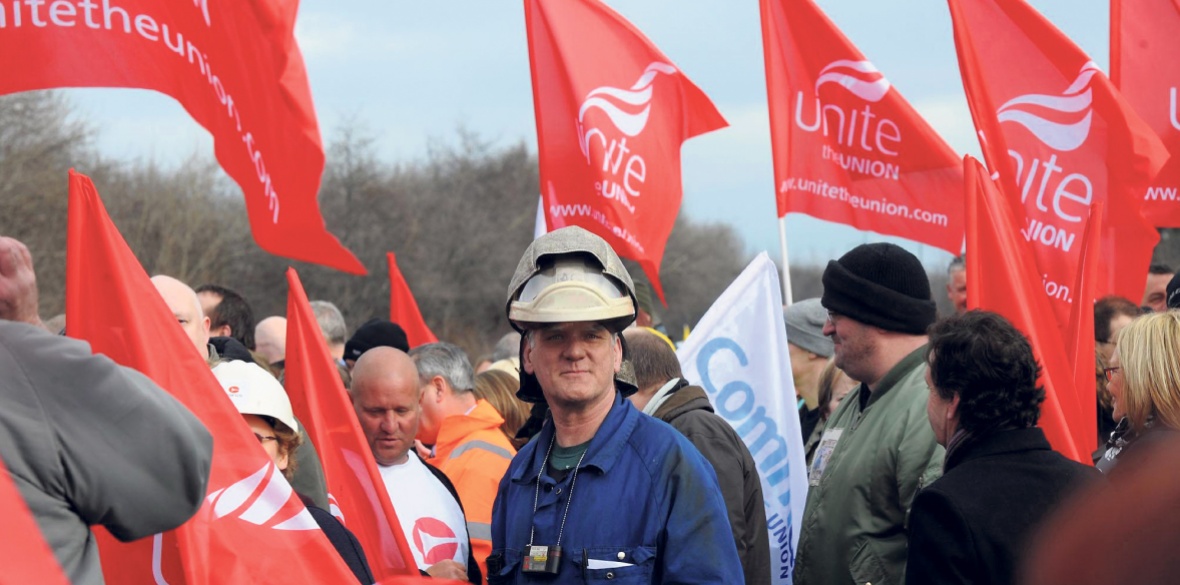This is the last article you can read this month
You can read more article this month
You can read more articles this month
Sorry your limit is up for this month
Reset on:
Please help support the Morning Star by subscribing here
EMPLOYERS like to peddle the myth that hard work never killed anyone — a blatant lie. There are numerous examples of workers being forced to work themselves into an early grave.
Working to the brink of exhaustion isn’t just a historic issue — it is happening daily across Britain.
A new survey undertaken by Unite of its members in the bus, construction and lorry-driving sectors generated 13,000 responses and has delivered some deeply disturbing results.
The survey found a long-hours culture and workers who are having their health and their relationships destroyed.
This is yet another example of the impact of the “race to the bottom,” with workers paying the price of corporate greed, where employers are determined to drain every last penny from workers, effectively treating them as a commodity to be squeezed and not as human beings. This is not just important for workers, it is about safety in our communities too.
The long-term effects of long and unsocial hours on our members are horrific.
In each of the three sectors roughly three-quarters of workers (74-76 per cent) said that long hours had affected their physical health, while the figures for mental health were between 50 to 58 per cent.
The damage done to workers’ relationships and family life were equally stark with 73 to 80 per cent reporting that a lack of work-life balance had damaged their lives.
What was truly harrowing were the anonymous testimonies from workers including: “one divorce and can’t remember my kids growing up,” “arthritis, constant back ache, torn knee ligament, don’t get sick pay, being treated for depression, split up with Mrs,” “took an overdose four days ago.”
Other members said: “I am currently on antidepressants and I’m tired and stressed out a lot,” “too tired to think about sex and unable to help with my elderly mother’s care,” “have been dismissed on capability grounds due to arthritis in numerous joints after 27 years with the same company.”
The survey revealed the reasons why workers’ health is being wrecked and their relationships with loved ones being destroyed.
For example, over half (54 per cent) of lorry drivers reported they regularly worked over 50 hours a week, with 28 per cent of construction workers reporting a similar working week, while over a third of bus drivers report working six days a week.
Another factor in the exhaustion of workers is a lack of breaks and rest periods.
Legally workers should have at least 11 hours’ rest between shifts (although this includes travelling to and from work and drivers can legally have this reduced several times a week).
Again, members report such minimums are regularly not complied with.
Over a third of bus drivers (38 per cent) and construction workers (34 per cent) reported that rest periods between shifts were just 10 hours.
The average person should have between seven and nine hours sleep a night but given the lack of time between shifts it is hardly surprising that workers report they don’t get that.
Across the three sectors the overwhelming majority (between 85 and 87 per cent) were getting six hours of sleep or less.
The other major factor in combating tiredness is having sufficient breaks during the working day. While lorry drivers report they generally have sufficient breaks (81 per cent) this is not the case for bus drivers and construction workers, with 46 per cent and 41 per cent respectively reporting they have insufficient breaks.
The long hours and constant tiredness has dramatic short and long-term consequences.
Most alarmingly 10 per cent of bus drivers and 4 per cent of lorry drivers admitted falling asleep at the wheel in the past year.
During the same time period over half of lorry drivers (57 per cent), just under half of construction workers (49 per cent) and 27 per cent of bus drivers, reported they had to stop work or stop driving due to excessive tiredness.
The status quo is not acceptable, Unite will not stand by as workers’ mental and physical health is shredded, our members’ family lives and relationships are ruined, their professionalism and work-life balance undermined, and community safety threatened, because of the ridiculous long hours they are required to work.
The survey’s findings also fundamentally challenge the proposals from the Conservative think tank the Centre for Social Justice that the pension age should be increased to 75.
Workers are being placed under unacceptable pressure at the moment, let alone if they are expected to work even longer.
There is no single magic solution to resolve these issues, each sector is different. For example, the first challenge for bus drivers and lorry drivers is to tackle deregulation and instability, raising low pay to stop workers feeling compelled to work long hours.
For construction workers it is about ending the hire-and-fire culture, where workers are constantly changing employers and work all the hours they can due to the fear of future unemployment.
However, the fact remains that where workers are well organised, the worst excesses of long hours are mitigated. It is why these challenges won’t be tackled without strong unions.
Unite is holding a fringe meeting at TUC Congress titled: Burning The Candle at Both Ends — The Effect of Long and Unsocial Hours on Workers’ Health and Relationships. The meeting is on Tuesday September 10 at 5.30pm in Meeting Room 8 of the Brighton Centre.









